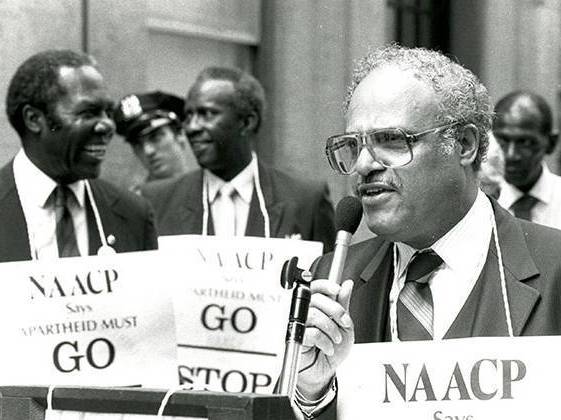Benjamin Lawson Hooks Papers
The Benjamin Lawson Hooks Papers: An Introduction
By William C. Love
 While there is substantive material on the FCC and Dr. Hooks’ wife, Frances Hooks,
the overwhelming majority of the collection pertains to Dr. Hooks’ time as Executive
Director of the NAACP. Of the 397 boxes in the collection, close to 380 pertain to
the NAACP between 1977 and 1993. The NAACP materials are broken into sub-series that
include General Activities, Administrative Files, Financial Materials, Legal Files,
The Crisis Magazine Materials, Branch Files, Photographs, Sound and Film Recordings,
Plaques and Awards, and Oversized Materials.
While there is substantive material on the FCC and Dr. Hooks’ wife, Frances Hooks,
the overwhelming majority of the collection pertains to Dr. Hooks’ time as Executive
Director of the NAACP. Of the 397 boxes in the collection, close to 380 pertain to
the NAACP between 1977 and 1993. The NAACP materials are broken into sub-series that
include General Activities, Administrative Files, Financial Materials, Legal Files,
The Crisis Magazine Materials, Branch Files, Photographs, Sound and Film Recordings,
Plaques and Awards, and Oversized Materials.
From the standpoint of research value, the “General Activities” are the richest in content. It includes correspondence, speeches, NAACP initiative proposals, subject files, and press releases. It also contains the majority of documents either in the voice of Benjamin Hooks or the voice of someone writing on his behalf. While it is often difficult to surmise the difference between the writing and thoughts of Dr. Hooks and those of his writers and assistants, we can be assured that the speeches, correspondence, and press releases at least reflect his general will and thoughts if not exact words. The subject files, while often provocatively labeled (e.g. Ku Klux Klan) are generally topical files compiled by Hooks and his assistants. There is little in the subject files in his voice and while it is of interest to know the kinds of issues Hooks and his team followed in the media, the subject files give little indication of his thoughts on their content.
The other main subseries of interest are the photographs and audio/visual materials. The photograph subseries primarily depicts NAACP events, specifically the annual conventions, fund raisers, and meetings between NAACP executives and private donors or public officials. The photographs number approximately 1500, but the volume is misleading. Of the 1500 photographs, many are either duplicates or multiple snaps of the same pose. Thus, there are probably close to 500 substantive photographs in the collection. The photographs are often unannotated and do not immediately relate to other parts of the collection. While one can certainly draw parallels between the photographs and the General Activities subseries, the photographs primarily serve as a visual index of NAACP events and award ceremonies given for Dr. Hooks after his retirement. While we aim to digitize the substantive photographs, the photographs primarily serve as an aesthetic supplement and introduction to the collection.
The audio/visual materials, by contrast, provide much interpretative substance. There are several dozen audiocassette tapes of sermons, speeches, and interviews given by Dr. Hooks over the course of his career as Executive Director of the NAACP and pastor of Greater Mt. Moriah Church in Detroit, Michigan. These recordings give the listener access to Dr. Hooks in his own words about topics he felt passionately about, such as the crisis of the black family, the role of the church in society, and the most pressings political issues of the 1980s and 1990s. There are also sermons and speeches of other individuals important to the church and the NAACP, such as Frances Hooks, Tom Diamond, and C.A. Clark. Some of the audiocassettes are mass produced commercial products concerning the black church or black history that we will not digitize. However, the speeches, sermons, and interviews given by Dr. Hooks are some of the most valuable aspects of the collection and will be made available to the public in digital form. There are also many video cassettes in the collection that while valuable, exceed the recording capacities of this project.
The collection does contain many folders of minimal research value such as call logs, calendars, and editions of The Crisis magazine available in circulation and in digital format on the official NAACP website. Still, it is a historically rich collection that would provide excellent context and content to professional and amateur historians interested in the history of Memphis, the NAACP, the Hooks family, and more general African-American history. We anticipate that many researchers will use the collection to further the study of Civil Rights that Dr. Hooks dedicated so much of his life to defending.
Read About Frances Hooks >